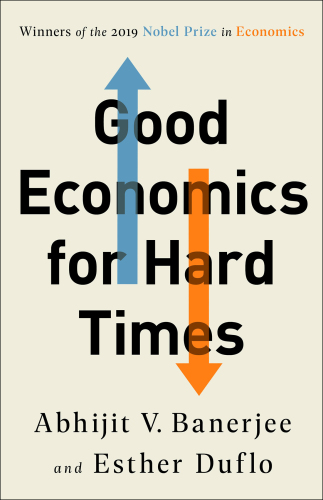
Good Economics for Hard Times
کتاب های مرتبط
- اطلاعات
- نقد و بررسی
- دیدگاه کاربران
نقد و بررسی

September 15, 2019
"Quality of life means more than just consumption": Two MIT economists urge that a smarter, more politically aware economics be brought to bear on social issues. It's no secret, write Banerjee and Duflo (co-authors: Poor Economics: A Radical Rethinking of the Way To Fight Global Poverty, 2011), that "we seem to have fallen on hard times." Immigration, trade, inequality, and taxation problems present themselves daily, and they seem to be intractable. Economics can be put to use in figuring out these big-issue questions. Data can be adduced, for example, to answer the question of whether immigration tends to suppress wages. The answer: "There is no evidence low-skilled migration to rich countries drives wage and employment down for the natives." In fact, it opens up opportunities for those natives by freeing them to look for better work. The problem becomes thornier when it comes to the matter of free trade; as the authors observe, "left-behind people live in left-behind places," which explains why regional poverty descended on Appalachia when so many manufacturing jobs left for China in the age of globalism, leaving behind not just left-behind people but also people ripe for exploitation by nationalist politicians. The authors add, interestingly, that the same thing occurred in parts of Germany, Spain, and Norway that fell victim to the "China shock." In what they call a "slightly technical aside," they build a case for addressing trade issues not with trade wars but with consumption taxes: "It makes no sense to ask agricultural workers to lose their jobs just so steelworkers can keep theirs, which is what tariffs accomplish." Policymakers might want to consider such counsel, especially when it is coupled with the observation that free trade benefits workers in poor countries but punishes workers in rich ones. Occasionally wonky but overall a good case for how the dismal science can make the world less--well, dismal.
COPYRIGHT(2019) Kirkus Reviews, ALL RIGHTS RESERVED.

Starred review from November 4, 2019
MIT professors Banerjee and Duflo (Poor Economics), winners of the 2019 Nobel Prize in Economics, apply pragmatic, real world–tested economic ideas to such issues as global trade, immigration, prejudice, income inequality, and the feasibility of a universal basic income in this lucid and frequently surprising account. The authors’ findings often run counter to conventional wisdom, as in their conclusion that immigrants do not lower wages or steal jobs from native workers, but actually create more wealth and income as they expand local communities. Banerjee and Duflo contend that employment provides people with dignity and an identity, not just income; therefore, a universal basic income won’t solve problems stemming from the lack of well-paying and meaningful jobs. Misguided moral thinking, the authors reveal in their takedown of claims that the U.S. welfare system is rampantly abused, often gets in the way of sound economic policy. They also make the case that impoverished people make sound financial decisions more often than they’re given credit for, citing the example of a Moroccan man who prioritized buying a television over purchasing food. When the lack of entertainment in his remote village and the value of relieving his family’s boredom are taken into consideration, the authors write, the man’s decision makes sense. Banerjee and Duflo’s arguments are original and open-minded and their evidence is clearly presented. Policy makers and lay readers looking for fresh insights into contemporary economic matters will savor this illuminating book.

























دیدگاه کاربران